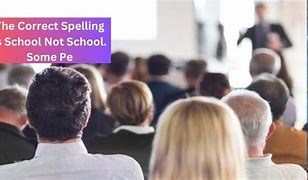Table of Contents
The correct spelling is school not school. some pe – tymoff In today’s digital age, where communication is often conducted through written text, the importance of proper spelling cannot be overstated. The phrase “the correct spelling is ‘school,’ not ‘shcool'” underscores a fundamental aspect of literacy that impacts various aspects of life, from education to professional settings. This article delves into the significance of correct spelling, common spelling mistakes, their implications, and strategies to improve spelling skills.
The Significance of The correct spelling is school not school. some pe – tymoff
The correct spelling is school not school. some pe – tymoff Proper spelling is a cornerstone of effective communication. It ensures that the intended message is conveyed accurately and understood by the reader. Spelling errors can lead to misunderstandings, misinterpretations, and can even change the meaning of a sentence. In professional settings, The correct spelling is school not school. some pe – tymoff spelling mistakes can reflect poorly on an individual’s attention to detail and professionalism, potentially affecting career advancement opportunities. The correct spelling is school not school. some pe – tymoff
The correct spelling is school not school. some pe – tymoff In educational contexts, spelling proficiency is a critical component of literacy. It is a foundational skill that supports reading and writing development. Students with strong spelling skills are more likely to excel in other areas of language arts, as spelling is closely linked to phonemic awareness, vocabulary, and comprehension. The correct spelling is school not school. some pe – tymoff
Common Spelling Mistakes and Their Implications
The correct spelling is school not school. some pe – tymoff One of the most common spelling mistakes is the transposition of letters, such as writing “shcool” instead of “school.” These errors can occur due to a variety of reasons, including typographical errors, phonetic similarities, and lack of familiarity with the correct spelling.The correct spelling is school not school. some pe – tymoff Other frequent mistakes include the confusion of homophones (e.g., “their,” “there,” and “they’re”), omission or addition of letters (e.g., “recieve” instead of “receive”), and incorrect use of silent letters (e.g., “knite” instead of “knight”).
The correct spelling is school not school. some pe – tymoff implications of spelling mistakes extend beyond mere errors on a page. In academic settings, they can affect grades and assessments, as spelling accuracy is often a criterion for evaluation. In professional environments, spelling mistakes in documents, emails, and presentations can undermine credibility and professionalism. For instance, a resume with spelling errors can leave a negative impression on potential employers, potentially costing a job opportunity.
The Role of Technology in Spelling
Technology has both positive and negative impacts on spelling skills. On the one hand, spell checkers and autocorrect features in word processors and mobile devices have made it easier to identify and correct spelling errors. These tools can help users catch mistakes they might otherwise overlook. However, an overreliance on technology can also hinder the development of spelling skills. When individuals depend too heavily on spell checkers,The correct spelling is school not school. some pe – tymoff may not learn to recognize and correct their own errors, leading to a lack of proficiency in spelling without technological assistance. The correct spelling is school not school. some pe – tymoff
Moreover, the informal nature of digital communication, such as texting and social media, often leads to the use of abbreviations, acronyms, and non-standard spelling. While these shortcuts can enhance the speed of communication, they can also contribute to the erosion of spelling skills, especially among younger generations who may not have fully developed their literacy skills. The correct spelling is school not school. some pe – tymoff
Strategies to Improve Spelling Skills
Improving spelling skills requires a combination of awareness, practice, and the use of effective strategies. Here are some tips to help enhance spelling proficiency: The correct spelling is school not school. some pe – tymoff
- Read Regularly: Reading a variety of texts exposes individuals to correct spelling and reinforces word recognition. This practice helps develop a mental lexicon of correctly spelled words.
- Practice Writing: Regular writing exercises, such as journaling, essay writing, and creative writing, provide opportunities to practice spelling. Reviewing and editing written work can also help identify and correct spelling errors.
- Use Mnemonics: Mnemonic devices can aid in remembering the correct spelling of challenging words. For example, the phrase “i before e except after c” can help recall the spelling of words like “receive” and “believe.”
- Study Word Patterns: Understanding common spelling patterns and rules can make it easier to spell new words. For instance, knowing that “silent e” often indicates a long vowel sound can help spell words like “bake” and “hide.”
- Break Words into Syllables: Dividing words into syllables can make them easier to spell. For example, breaking down “unbelievable” into “un-be-liev-a-ble” can help ensure each syllable is spelled correctly.
- Use Spelling Games and Apps: There are numerous educational games and apps designed to improve spelling skills. These tools can make learning to spell fun and engaging, especially for younger learners.
- Seek Feedback: Constructive feedback from teachers, peers, or mentors can help identify recurring spelling mistakes and provide guidance on how to correct them.
The Impact of Spelling on Learning and Cognitive Development
Spelling is more than just a mechanical skill; it plays a significant role in cognitive development and learning processes. Mastery of spelling involves various cognitive functions, including memory, attention, and phonological processing. Research has shown that spelling proficiency is linked to reading comprehension and overall literacy. Students who struggle with spelling often face challenges in other areas of academic performance, as spelling difficulties can impede their ability to express ideas clearly and accurately in writing.
Moreover, the process of learning to spell enhances phonological awareness, which is the ability to recognize and manipulate the sounds in spoken language. Phonological awareness is a critical skill for reading development, as it helps learners decode words and understand their meanings. As students become more proficient in spelling, they develop a better understanding of the relationship between letters and sounds, which in turn supports their reading and writing abilities.
Spelling in the Digital Age: Challenges and Opportunities
The digital age has brought about significant changes in the way we communicate and learn. While technology offers valuable tools for improving spelling, it also presents new challenges. The prevalence of informal writing on digital platforms, such as social media and texting, has led to the widespread use of abbreviations, acronyms, and non-standard spelling. This shift in communication norms can make it difficult for individuals to maintain traditional spelling skills.
However, the digital age also provides opportunities for enhancing spelling proficiency. Online resources, such as educational websites, spelling games, and language learning apps, offer interactive and engaging ways to practice spelling. Additionally, digital dictionaries and thesauruses provide instant access to correct spellings and word definitions, making it easier for individuals to expand their vocabulary and improve their spelling skills.
Educators can leverage technology to support spelling instruction by incorporating digital tools into the classroom. For example, spelling software programs can provide personalized feedback and track students’ progress, allowing teachers to tailor instruction to meet individual needs. Virtual spelling bees and online spelling challenges can also motivate students to practice and improve their spelling skills in a fun and competitive environment.
Conclusion
The importance of correct spelling cannot be overstated. It is a fundamental aspect of effective communication that impacts academic performance, professional credibility, and overall literacy. Common spelling mistakes, such as writing “shcool” instead of “school,” highlight the need for attention to detail and the development of strong spelling skills.
While technology offers valuable tools for identifying and correcting spelling errors, it is essential to cultivate spelling proficiency through practice and awareness. Reading regularly, practicing writing, using mnemonic devices, studying word patterns, and seeking feedback are effective strategies for improving spelling skills.
In the digital age, educators and learners must navigate the challenges and opportunities presented by technology. By leveraging digital tools and resources, individuals can enhance their spelling proficiency and support their cognitive development and learning processes. Ultimately, mastery of spelling is a critical component of literacy that empowers individuals to communicate clearly, accurately, and effectively in both personal and professional contexts.
4o


